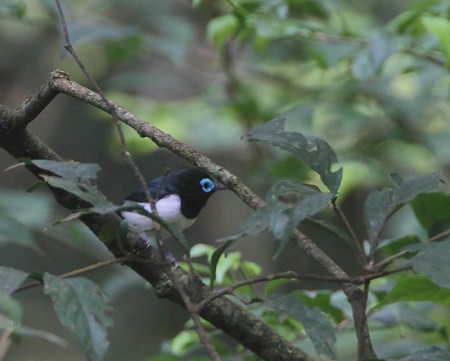(→Taxonomy: Update link) |
|||
| Line 11: | Line 11: | ||
North-eastern [[Democratic Republic of the Congo]], [[Uganda]], southern [[Sudan]], western [[Kenya]], and northern [[Tanzania]]. | North-eastern [[Democratic Republic of the Congo]], [[Uganda]], southern [[Sudan]], western [[Kenya]], and northern [[Tanzania]]. | ||
==Taxonomy== | ==Taxonomy== | ||
| − | This is a [[Dictionary_M- | + | This is a [[Dictionary_M-O#M|monotypic]] species<sup>[[#References|[1]]]</sup>. |
This species is placed in the genus ''[[:Category:Dyaphorophyia|Dyaphorophyia]]'' by some authorities.<sup>[[#References|[2]]]</sup> | This species is placed in the genus ''[[:Category:Dyaphorophyia|Dyaphorophyia]]'' by some authorities.<sup>[[#References|[2]]]</sup> | ||
| + | |||
==Habitat== | ==Habitat== | ||
Forest understory and secondary growth. | Forest understory and secondary growth. | ||
Revision as of 22:34, 30 June 2014
- Platysteira jamesoni
Identification
Length 9 cm. Blue-green eye wattles; black bill, legs and feet; chestnut patches extend from beneath the eyes down the sides of the neck; black throat and white lower breast and belly.
The male has glossy black upperparts whereas the upperparts of the female are dark grey.
Similar species
Red-cheeked Wattle-eye which has a larger chestnut cheek-patch; ranges do not overlap.
Distribution
North-eastern Democratic Republic of the Congo, Uganda, southern Sudan, western Kenya, and northern Tanzania.
Taxonomy
This is a monotypic species[1].
This species is placed in the genus Dyaphorophyia by some authorities.[2]
Habitat
Forest understory and secondary growth.
Behaviour
Vocalisation
Whistled tsip tsip tseer and a monotonous tsip tsip tsip tsip....
References
- Clements, JF. 2009. The Clements Checklist of Birds of the World. 6th ed., with updates to December 2009. Ithaca: Cornell Univ. Press. ISBN 978-0801445019.
- Sinclair, I and P Ryan. 2003. Birds of Africa South of the Sahara. Princeton: Princeton Univ. Press. ISBN 978-0691118154




